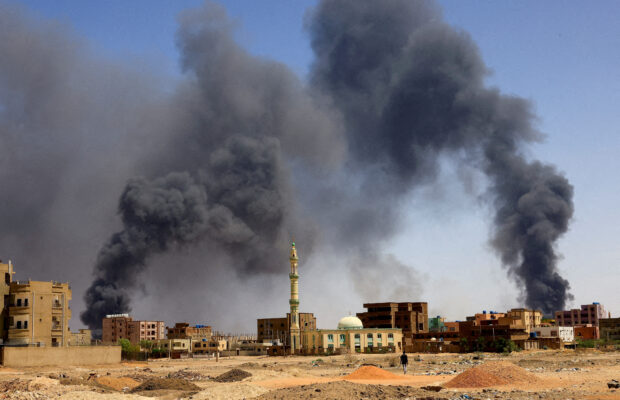Massive fire as Sudanese factions battle for control of arms factory

A man walks while smoke rises above buildings after aerial bombardment, during clashes between the paramilitary Rapid Support Forces and the army in Khartoum North, Sudan, May 1, 2023. REUTERS FILE PHOTO
KHARTOUM — A massive fire broke out on Wednesday near a military complex containing an arms factory in southern Khartoum that Sudan’s army has battled to defend in some of the fiercest fighting for weeks in its conflict with a rival faction, witnesses said.
The paramilitary Rapid Support Forces (RSF), in the eighth week of a power struggle with the army, attacked the heavily protected, sprawling Yarmouk complex on Tuesday, witnesses said. The group on Wednesday posted videos in which it claimed to have taken over a warehouse filled with weapons and ammunition as well as several entry points to the site.
The army used air strikes to try to repel the RSF advance, witnesses said.
Fighting across the three cities that make up Sudan’s greater capital region – Khartoum, Bahri and Omdurman – has picked up since a 12-day ceasefire between the army and RSF formally expired on June 3 after repeated violations.
“Since yesterday there has been a violent battle with the use of planes and artillery and clashes on the ground and columns of smoke rising,” Nader Youssef, a resident living near Yarmouk, told Reuters by phone.
Article continues after this advertisementDue to the proximity of fuel and gas depots, “any explosion could destroy residents and the whole area”, he said.
Article continues after this advertisementA fire that began in the morning suddenly grew in size before sunset on Wednesday as explosions were heard, another resident living close to the depots said.
Local activists said the fires were caused by the bombing of the fuel and gas depots, and that houses in the area had been hit by shells and stray bullets.
Residents in Omdurman and Bahri, about 15 km (9 miles) away, reported that towering flames were visible after nightfall from Yarmouk.
The RSF quickly seized swathes of the capital after war erupted in Khartoum on April 15. Army air strikes and artillery fire have not dislodged them, but the RSF may face a challenge restocking with ammunition and fuel as the conflict drags on.
The violence has derailed the launch of a transition towards civilian rule four years after a popular uprising ousted strongman President Omar al-Bashir. The army and RSF, which together staged a coup in 2021, fell out over the chain of command and military restructuring plans under the transition.
Water shortages
The conflict has wreaked havoc on the capital, reignited deadly violence in the long volatile western region of Darfur and displaced more than 1.9 million people.
Most health services and the banking system have collapsed, power and water is often cut and looting has spread. Food supplies have been dwindling.
UNICEF said on Wednesday that some 297 children were evacuated from Khartoum’s Mygoma orphanage, which has been in the midst of heavy fighting. Reuters previously reported that dozens of babies had died there since the war began due to dehydration and malnutrition, and that the orphanage had housed about 400 children before the conflict started.
In Bahri, north of the Blue Nile from Khartoum, local activists said that more than 50 days of water cuts had driven many people from their homes and that they could be caught in the crossfire if they searched for water.
More than 1.4 million people have been displaced within Sudan and a further 476,800 have fled into neighbouring countries, most of which are already struggling with poverty and internal conflict, according to estimates from the International Organization for Migration (IOM).
Sudan’s health ministry has recorded at least 780 civilian deaths as a direct result of the fighting. Hundreds more have been killed in the city of El Geneina in West Darfur. Medical officials say many bodies remain uncollected or unrecorded.
In Jeddah, a mediation source said negotiations were continuing in an effort to ensure safe passage for humanitarian assistance. Saudi Arabia and the United States brokered the ceasefire that ended on Saturday in talks there.
Consultations for a new truce deal, which had been reported by Saudi TV station Al Arabiya on Tuesday, were at an early stage and complicated by continued fighting, the source said.
“We urgently call on the warring parties to adhere to their commitments … and to return to the Jeddah dialogue to resolve issues around violations and reach a ceasefire that is respected fully,” countries including the United States, Saudi Arabia, the United Arab Emirates and the European Union said.
The United Nations says some 25 million – more than half Sudan’s population – are in need of humanitarian assistance and that aid that could help about 2.2 million people had been delivered since late May.